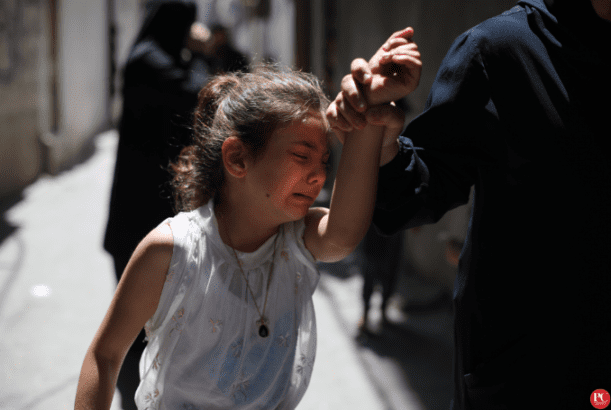Israel’s unprovoked attack on Gaza should never have started – and now it won’t end because Israel clings to its desire to violate international law indefinitely.
by Kathryn Shihadah
The Jerusalem Post reported today that ceasefire negotiations are stalled because Israel refuses to give in to two demands from Gazan resistance leaders – demands that would require Israel to abide by international law.
Gaza’s Islamic Jihad insists that Israel end its policy of assassinating Palestinian resistance leaders, and return the body of Khader Adnan, who died in an Israeli prison last week after an 86-day hunger strike.
Israel has killed about 24 Palestinians in Gaza since May 9, the majority of them civilians. The first attack came in the middle of the night as Islamic Jihad leaders slept in their homes, killing 3 military leaders and family members – 4 women and 4 children – along with civilian neighbors.
Palestinian human rights group Al-Haq pointed out:
This deliberate and premeditated act underscores the fact that the killing of Palestinian families and children is not a mere oversight but rather a carefully calculated one, and is part of a systemic policy.
International law on assassination
Foreign Policy explains that the 1907 Hague Convention, the 1998 Rome Statute, and Article 6 of the International Covenant on Civil and Political Rights forbid extrajudicial killing as a
fundamental tenet of human rights. Criminals, terrorists, and gang members must be properly arrested, tried, and convicted of a capital offense before they can be put to death…
On these grounds, organizations like Human Rights Watch, Amnesty International, and the United Nations Office of the Special Rapporteur on Extrajudicial, Summary, or Arbitrary Executions have repeatedly stated that targeted killings violate international human rights law.
Foreign Policy adds that “killing is permitted only when the targets are directly engaged in hostilities. Hunting them down when they are going about their everyday business is prohibited.”
(The exception is in a time of imminent threat when no arrest is possible, “such as a SWAT team shooting a hostage-taker.”)
Clearly, the assassinations Israel has already carried out this week qualify as unlawful.
Israel refuses to broker a ceasefire in order to continue carrying out such killings. Prime Minister Benjamin Netanyahu addressed Gaza’s resistance leaders: “We see you everywhere. You can’t hide, and we choose the place and time to strike you.”
Israel’s other ceasefire sticking point is Khader Adnan, who died last week in prison, and whose remains resistance groups demand so that his family can give him a proper burial. Israel refuses to comply.
International law on withholding the bodies of the deceased
According to Al Haq, customary international humanitarian law demands respect for the dead; all 4 Geneva Conventions declare that their remains must be returned to their families.
In addition, the practice of withholding the bodies of combatants amounts to collective punishment, which is clearly prohibited under multiple covenants – all of which Israel has recognized or undersigned.
In 2017, the Israeli Supreme Court had ruled against the state of Israel in its practice of withholding bodies of Palestinians, and demanded that it release bodies to their families for burial.
In 2018, Israel requested a second hearing, and the Court reversed its decision.
Adalah, a Palestinian human rights group, commented at the time that the Israeli Supreme Court
rendered a decision that makes Israel’s ongoing violation of international humanitarian law (IHL) possible. IHL prohibits the occupying power from holding bodies, and using them as bargaining chips.
In addition, the Supreme Court’s decision further delays the transfer of the bodies for burial, thus giving a green light to the grave violation of the right of the families and the deceased themselves to a prompt and proper burial.
[The ruling marked] the first time in history that a court – anywhere in the world – authorizes state authorities to hold the bodies of individuals under its control, to which international laws governing occupation apply, and to use them as bargaining chips. It undermines the most basic principles of universal humanity, and violates both Israeli law and international law.
[Read more on the withholding of Palestinian – and Israeli – bodies here.]
In short, Israel’s refusal to agree to a ceasefire with Gaza boils down to its insistence on continuing to violate international law.
- For a list of Palestinians and Israelis killed since 2000, visit Israel-Palestine Timeline
- For information on Palestinian rockets see this
Kathryn Shihadah is an editor and staff writer for If Americans Knew. She also blogs occasionally at Palestine Home.
FURTHER READING ON WITHHOLDING OF PALESTINIAN REMAINS:
- Dying to leave Gaza – and to get back in
- Israeli Army Shoots and Kills Two Palestinians, Withholds Bodies
- Israeli soldiers shoot Palestinian man dead, seize body
- Khader Adnan’s death & Israel’s decades of despotic military orders
FURTHER READING ON ISRAELI ASSASSINATIONS:
- Invading Israeli forces assassinate 5 more Palestinians in two days, including 16-yr-old
- Israeli forces assassinate two Palestinians in occupied Nablus
- Israel To Continue Assassinations In West Bank
- Israeli Soldiers Assassinate Palestinian – 14th this month (1 Israeli dead)
FURTHER READING ON THE CURRENT CRISIS IN GAZA:
- Israeli Missiles Kill Eight Palestinians, Including A Child, In Gaza
- Israel closes Gaza crossings; possible serious deterioration of humanitarian conditions
- Israel attacks Gaza, killing 15 Palestinians, including women and children
VIDEOS:





